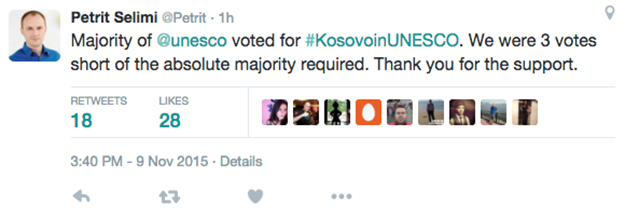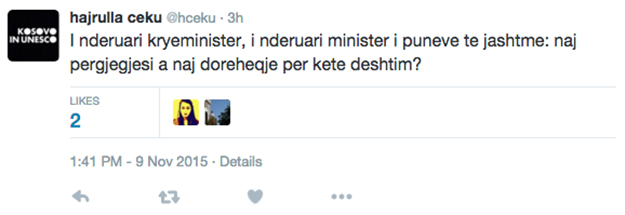Today, the members of UNESCO, the UN-agency dedicated to Science, Culture, and Education, have rejected Kosovo’s membership bid. A total of 171 member states participated in the vote, which finished with 92 votes in favor of Kosovo’s membership, 50 votes against, and 29 abstentions. A two thirds majority was required, leaving Kosovo only three votes away from entering UNESCO.
Kosovo will have to wait until at least 2017 to have a new opportunity, when the General Conference of UNESCO will meet again. This body, composed by 195 country members, meets only every two years.
Prior to the vote on the motion to decide Kosovo’s membership, the members of the General Conference had rejected a motion put forward by Serbia, supported by Russia and other countries, to postpone Kosovo’s membership vote. In this voting process, in which 170 members took part, 89 member states voted against Serbia’s proposal, 59 in favor, and 22 abstained.
Kosovo started its lobby campaign for the “yes” vote in January 2015, yet encountered strong opposition and lobbying from neighboring Serbia.
October 21, the Executive Board of UNESCO, composed of 58 members, approved a recommendation to admit Kosovo as a new member, with the support of 44 members, thereby taking the issue forward to a full vote at the General Conference.
Some public voices have already reacted to the results of the vote.
Hashim Thaci, Kosovo’s deputy prime minister and minister of foreign affairs — and the person with ultimate accountability for the bid — quickly moved to paint a positive picture of the failed application: “Kosovo’s path is unstoppable and we will apply again and we will become members of others organizations as well, including UNESCO,” Thaci wrote on Facebook.
Deputy minister of foreign affairs, Petrit Selimi, who has been on the front line of the diplomatic efforts for the “Kosovo in UNESCO” campaign similarly attempted to take the positives, tweeting that Kosovo had received a majority of the votes from UNESCO members.
Despite the official attempts to put a brave face on the situation, the ministers were quickly met with calls for their resignations for what some perceive as an ultimate failure of ten months of diplomacy. Hajrulla Ceku, director of the cultural organization EC MA Ndryshe, which is especially active in the cultural heritage sector, tweeted: “Dear prime minister, dear minister of foreign affairs: Is there any responsibility, any resignation for this failure?”
While over the past few weeks in Kosovo we have seen a broad unity throughout the internet in support of the #KosovoInUNESCO campaign, that unified support quickly fragmented in light of the rejection, and criticism of the government’s efforts to enter UNESCO were widespread.
Voices from the opposition used the occasion to renew their calls to break the dialogue with Serbia due to the country’s strong lobbying campaign against Kosovo. Vetevendosje’s Ilir Deda wrote on his Facebook account that this is Kosovo’s “first failure” in the international arena since the declaration of independence in 2008. “Kosovo must stop the dialogue with Serbia and the implementation of the association of municipalities right away,” wrote Deda, who also stated that no dialogue with Serbia makes sense without a recognition of independence and asked for the resignation of those responsible in the government.
Enver Robelli, influential writer and journalist, also offered a damning assessment on Facebook. “The battle for UNESCO membership served as a carrot to distract attention from the failures in the process to secure more recognition for the Republic of Kosovo,” he wrote. “The main lesson is that Kosovo should have non partisan and professional diplomacy, but also politicians with clean hands that introduce a functional state to the world. Kosovo is not such a state.”
While Kosovo will now be left out in the cold from UNESCO for at least another two years, it remains to be seen if there will be any recriminations within the government and where it will focus its foreign policy attention next.



